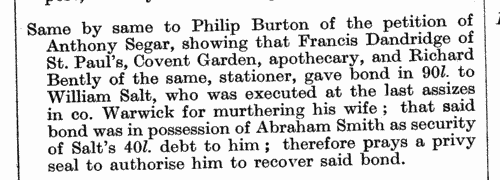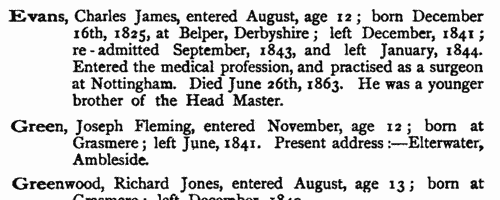Mease Surname Ancestry ResultsOur indexes 1000-1999 include entries for the spelling 'mease'. In the period you have requested, we have the following 68 records (displaying 11 to 20): Single Surname Subscription | | | Buying all 68 results of this search individually would cost £340.00. But you can have free access to all 68 records for a year, to view, to save and print, for £100. Save £240.00. More... |
These sample scans are from the original record. You will get scans of the full pages or articles where the surname you searched for has been found. Your web browser may prevent the sample windows from opening; in this case please change your browser settings to allow pop-up windows from this site. York Will Calendar
(1660-1665)
The diocese of York comprised most of Yorkshire, and Nottinghamshire: the York Exchequer court was the ordinary probate jurisdiction for the Yorkshire part of the diocese, but some wills from Nottinghamshire and other parts of the province of York were also proved there. Dr Francis Collins compiled this index to the wills in the York registry proved from 1660 to 1665. The date of the probate precedes the name of the testator: during the period covered by the volume the dates of probate are very rarely given in the registers - they were therefore supplied from the Act Books. However, the Act Book for Ainsty, City and Craven deaneries is missing for this period, and in those cases no date could be given. In a very few instances (marked with an asterisk) in these deaneries in which the date has been supplied it has been taken from the registers. Additional matter from the Act Books is given within square brackets. Testators' names are given in full, surname first; then parish or place of abode, and in some cases occupation; then date of the will itself; and volume and folio number in the probate register. Where a place of burial, or intended burial, was indicated, that is also added, with the word 'bur.', within round brackets. All wills between 1652 and 1660 were proved in London; in practice, many Yorkshire wills had remained unproved at the date that the York Exchequer probate court was restored, and so there is in this list a large number of wills dating back through the 1650s.MEASE. Cost: £2.00.  | Sample scan, click to enlarge

| Official Papers
(1677-1678)
The State Papers Domestic cover all manner of business relating to Britain, Ireland and the colonies, conducted in the office of the Secretary of State as well as other miscellaneous records. Includes lists of passes to travel abroad.
MEASE. Cost: £4.00.  | Sample scan, click to enlarge

| Official Papers
(1660-1681)
The State Papers Domestic cover all manner of business relating to Britain, Ireland and the colonies, conducted in the office of the Secretary of State as well as other miscellaneous records. MEASE. Cost: £4.00.  | Sample scan, click to enlarge

| Treasury and Customs Records
(1685-1688)
Government accounts, with details of income and expenditure in Britain, America and the colonies
MEASE. Cost: £4.00.  | Sample scan, click to enlarge

| House of Lords Proceedings
(1692-1693)
Private bills dealing with divorce, disputed and entailed estates: petitions, reports and commissions: naturalisation proceedings.
MEASE. Cost: £4.00.  | Sample scan, click to enlarge

|  Masters of Apprentices registered in Berkshire
(1715-1717) Masters of Apprentices registered in Berkshire
(1715-1717)
Apprenticeship indentures and clerks' articles were subject to a 6d or 12d per pound stamp duty: the registers of the payments usually give the master's trade, address, and occupation, and the apprentice's father's name and address, as well as details of the date and length of the apprenticeship. There are central registers for collections of the stamp duty in London, as well as returns from collectors in the provinces. These collectors generally received duty just from their own county, but sometimes from further afield. Because of the delay before some collectors made their returns, this register includes indentures and articles from as early as 1714. (The sample entry shown on this scan is taken from a Norfolk return)MEASE. Cost: £8.00.  | Sample scan, click to enlarge

|  Apprentices registered at Gloucester
(1728-1731) Apprentices registered at Gloucester
(1728-1731)
Apprenticeship indentures and clerks' articles were subject to a 6d or 12d per pound stamp duty: the registers of the payments usually give the master's trade, address, and occupation, and the apprentice's father's name and address, as well as details of the date and length of the apprenticeship. There are central registers for collections of the stamp duty in London, as well as returns from collectors in the provinces. These collectors generally received duty just from their own county, but sometimes from further afield. (The sample entry shown on this scan is taken from a Norfolk return)MEASE. Cost: £8.00.  | Sample scan, click to enlarge

|  Apprentices registered at Norwich in Norfolk
(1741-1745) Apprentices registered at Norwich in Norfolk
(1741-1745)
Apprenticeship indentures and clerks' articles were subject to a 6d or 12d per pound stamp duty: the registers of the payments usually give the master's trade, address, and occupation, and the apprentice's father's name and address, as well as details of the date and length of the apprenticeship. There are central registers for collections of the stamp duty in London, as well as returns from collectors in the provinces. These collectors generally received duty just from their own county, but sometimes from further afield. (The sample entry shown on this scan is taken from a Norfolk return)MEASE. Cost: £8.00.  | Sample scan, click to enlarge

| Tradesmen of York
(1559-1759)
No man or woman could trade in the city of York without having obtained 'freedom' of the city. Their names were recorded on the 'Freemen's Roll', or Register of the Freemen of the City of York, which contains about 16,600 names for this period. A list of names was prepared for each year. Each annual list starts with the name of the mayor and the camerarii or chamberlains. The chamberlains were freemen charged with the duty of receiving the fees of the new freemen; of seeing that only freemen traded in the city; and of preparing this roll, which was compiled from the names on their own account books from the receipts for the fees. There are three groups of freemen: those who obtained freedom after serving out an apprenticeship to a freeman; the children of freemen (per patres); and a handful who claimed freedom by 'redemption', i. e. by purchase or gift from the Mayor and Court of Aldermen.
MEASE. Cost: £2.00.  | Sample scan, click to enlarge

| Boys entering Sedbergh School
(1745-1760)
B. Wilson prepared this edition of the register of the Grammar School at Sedbergh in the West Riding of Yorkshire, published in 1895. Sedbergh school had three exhibitions at St John's College, Cambridge, and for the earliest years little more could be found about the pupils at the school than was recorded at St John's or other colleges. In 1700-1706 the first material from Sedbergh appears, but no more than lists of surnames. From 1746 onwards full names, or surnames and initials, are found for those boys who did not continue to university. It is only from 1820 onwards that the school register starts to give detail: month of entry, age, birthplace, and month of leaving. From then onwards Wilson was able to add more and more biographical detail, except, of course, for those boys in 1895 still at the school or with their careers yet ahead of them.MEASE. Cost: £4.00.  | Sample scan, click to enlarge

|
Research your ancestry, family history, genealogy and one-name study by direct access to original records and archives indexed by surname.
|













